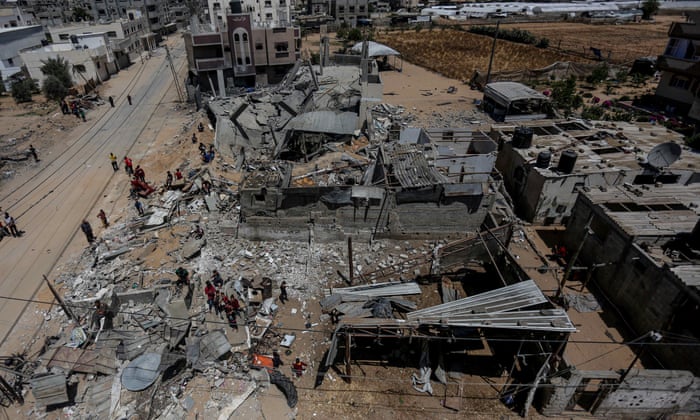Biden expresses support for Israel-Gaza ceasefire as pressure on US rises
Israel carries out fresh wave of pre-dawn airstrikes but US president stops short of demanding halt to hostilities
Joe Biden has issued a statement for the first time expressing support for a ceasefire between Israel and Gaza’s militant rulers, Hamas, after a phone conversation with the Israeli prime minister, Benjamin Netanyahu.
However, the US president stopped short of calling for an immediate halt to the eight days of Israeli airstrikes and Hamas rocket barrages that have killed more than 200 people, the vast majority of them Palestinian.
“The president reiterated his firm support for Israel’s right to defend itself against indiscriminate rocket attacks,” the White House statement said after the phone call, the second known call between the leaders in three days.
“He encouraged Israel to make every effort to ensure the protection of innocent civilians. The two leaders discussed progress in Israel’s military operations against Hamas and other terrorist groups in Gaza. The president expressed his support for a ceasefire and discussed US engagement with Egypt and other partners towards that end.”
Israel carried out a fresh wave of airstrikes in the pre-dawn hours of Tuesday, levelling a building in Gaza City. The Israeli military said it had fired 100 bombs and missiles against 65 targets. There were no immediate reports of casualties.
The military said it also shot down a drone “approaching the Israeli border” in the north-east, far from the Gaza fighting. It did not say where the drone originated, and the army could not immediately be reached for comment. It is possible the drone came from Syria.
A strike launched from Gaza on Tuesday killed two Thai workers inside a packaging plant in southern Israel, and wounded another seven people, police said.
Israeli reports quoting military officials suggested that Israeli forces wanted to continue their military operations for another day or two before withdrawing. Netanyahu told Israeli security officials late on Monday that Israel would “continue to strike terror targets” in Gaza “as long as necessary in order to return calm and security to all Israeli citizens”.
Meanwhile, the US blocked – for the third time in a week – the adoption of a joint UN security council statement calling for a halt to Israeli-Palestinian violence. The White House press secretary, Jen Psaki, and the national security adviser, Jake Sullivan, said the US was focusing instead on “quiet, intensive diplomacy”.
The US secretary of state, Antony Blinken, speaking in Denmark on Monday, said the US was ready to help if Israel and Hamas signalled interest in ending hostilities – but that the US wasn’t demanding that they do so.
“Ultimately it is up to the parties to make clear that they want to pursue a ceasefire,” Blinken said, before noting that it was “a big world and we do have responsibilities”.
General strikes were held on Tuesday in East Jerusalem, Arab towns within Israel and in the Israeli-occupied West Bank, with posts on social media bearing a Palestinian flag and urging solidarity “from the sea to the river”. Palestinian businesses across East Jerusalem were shuttered, including in the walled Old City, and in the mixed Jewish-Arab port city of Haifa in northern Israel, protest organiser Raja Zaatar told Reuters the strike had closed 90% of businesses in Arab neighbourhoods.
The latest outbreak began in East Jerusalem last month when Israeli police cracked down on Palestinian public gatherings during Ramadan, and the Israeli supreme court prepared to issue a ruling – since delayed – on the threatened eviction of Palestinian families by Jewish settlers. Tensions exploded last week after Israeli police wounded hundreds of Palestinians during protests, and officers in riot gear stormed al-Aqsa mosque – the third holiest site in Islam.
Hamas then began firing rockets toward Jerusalem, triggering the Israeli assault on Gaza. Gaza health officials put the Palestinian death toll at 213, including 61 children and 36 women, since hostilities began last week. Twelve people have been killed in Israel, including two children.
A US administration official familiar with Monday’s call told Associated Press the decision to not explicitly demand a ceasefire was intentional. Biden and top aides are concerned about the mounting bloodshed and loss of innocent life, but the statement’s wording reflects White House determination to support Israel’s right to defend itself from Hamas, the unnamed official said.
Biden has been facing increasing pressure from his own party to take a tougher line towards Israel and press for an immediate ceasefire. There was outrage from some Democrats over a Washington Post report that the administration had approved the sale to Israel of $735m-worth of precision-guided bombs.
On Monday night, the top US military officer, Army Gen Mark Milley, warned that the violence could spread.
“My assessment is that you risk broader destabilization and you risk a whole series of negative consequences if the fighting continues,” Milley, the chairman of the joint chiefs of staff, told reporters before landing in Brussels on Monday for talks with Nato allies. “It’s in no one’s interest to continue fighting.”
President Abdel Fatah al-Sisi of Egypt, which has long acted as a mediator between Israel and Hamas, said on Monday a ceasefire could be within reach.
On Monday, the Israeli army said it launched artillery towards Lebanon in response to rocket fire from the neighbouring country. “Six failed launch attempts were identified from Lebanon that did not cross into Israeli territory,” the army said in a statement. “Artillery forces fired toward the sources of the launches.”
A Lebanese military source told Agence France-Presse three “Grad-type rockets” rockets had been fired from near the border towards Israel. It is the second time rockets have been launched from Lebanese territory towards Israel since the latest hostilities flared.

